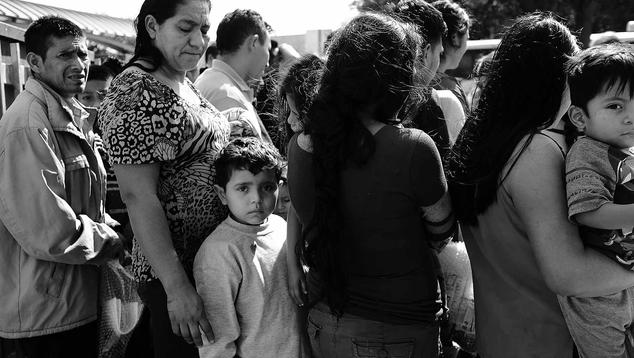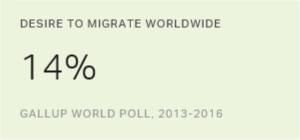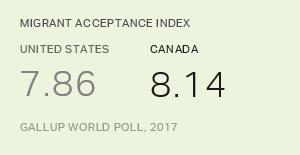Story Highlights
- 15% of the world's adults would like to migrate if they could
- 33% of adults in Central American countries would like to migrate
- 16% in Central America would like to move to the U.S.
WASHINGTON, D.C. -- The several thousand Central American asylum seekers and migrants who are slowly making their way toward the U.S. border may be unusual because of the size of their group, but their desire to come to the U.S. is not. They actually represent a relatively small fragment of a much larger group of people in their own region -- and around the world -- who say they would like to move to the U.S. if they could.
In Gallup's most recent global estimate, between 2015 and 2017, 15% of the world's adults -- more than 750 million people -- said they would like to move to another country permanently if they could. In Central America, this percentage is one in three (33%), or about 10 million adults.
Three percent of the world's adults -- or nearly 160 million people -- say they would like to move to the U.S. This includes 16% of adults from Honduras, Nicaragua, Guatemala, El Salvador, Panama and Costa Rica, which translates into nearly 5 million people.
| Desire to migrate | Would like to move to U.S. | ||||||||||||||||||||||||||||||||||||||||||||||||||||||||||||||||||||||||||||||||||||||||||||||||||
|---|---|---|---|---|---|---|---|---|---|---|---|---|---|---|---|---|---|---|---|---|---|---|---|---|---|---|---|---|---|---|---|---|---|---|---|---|---|---|---|---|---|---|---|---|---|---|---|---|---|---|---|---|---|---|---|---|---|---|---|---|---|---|---|---|---|---|---|---|---|---|---|---|---|---|---|---|---|---|---|---|---|---|---|---|---|---|---|---|---|---|---|---|---|---|---|---|---|---|---|
| % of adults | % of adults | ||||||||||||||||||||||||||||||||||||||||||||||||||||||||||||||||||||||||||||||||||||||||||||||||||
| World | 15 | 3 | |||||||||||||||||||||||||||||||||||||||||||||||||||||||||||||||||||||||||||||||||||||||||||||||||
| Central America* | 33 | 16 | |||||||||||||||||||||||||||||||||||||||||||||||||||||||||||||||||||||||||||||||||||||||||||||||||
| *Includes Costa Rica, El Salvador, Guatemala, Honduras, Nicaragua and Panama | |||||||||||||||||||||||||||||||||||||||||||||||||||||||||||||||||||||||||||||||||||||||||||||||||||
| Gallup World Poll, based on aggregated data from surveys conducted 2015-2017 | |||||||||||||||||||||||||||||||||||||||||||||||||||||||||||||||||||||||||||||||||||||||||||||||||||
But unlike the caravan of Central American migrants who are currently on the move, most people who desire to migrate will never try to make their way to the U.S. Desire remains only that. Gallup typically finds that the percentage of those who have plans to move is substantially lower than the percentage who would like to move, and even fewer are actively making preparations to do so.
Central America is no different in this regard. For example, in Honduras, whose residents make up a large percentage of the migrant caravan, about half of adults (47%) say they would like to move to another country permanently if they could, but about 9% are planning to move in the next year -- and 2% are actively preparing to do so.
Implications
The caravan of asylum seekers and migrants is currently weighing whether it will remain in Mexico or push on to the U.S. Those who decide to push on speaks to the risks migrants are willing to take -- and also the strong draw that the U.S. continues to be for millions.
For the past decade, Gallup's global studies have shown that the U.S., more so than any other country, has been the top desired destination for people who say they would like to move. Central Americans are no exception. People in this region who would like to move -- if they could -- say they would like to move to the U.S. more than any other place in the world.
However, this desire to move to the U.S. started to show signs of waning in Central America in 2017, and it seems to have persisted in a number of countries so far in 2018. This could possibly reflect changes in the climate toward migrants in the U.S. under the Trump administration -- but it is still too early to tell, and Gallup will continue to monitor it.
For complete methodology and specific survey dates, please review Gallup's Country Data Set details.
Learn more about how the Gallup World Poll works.



